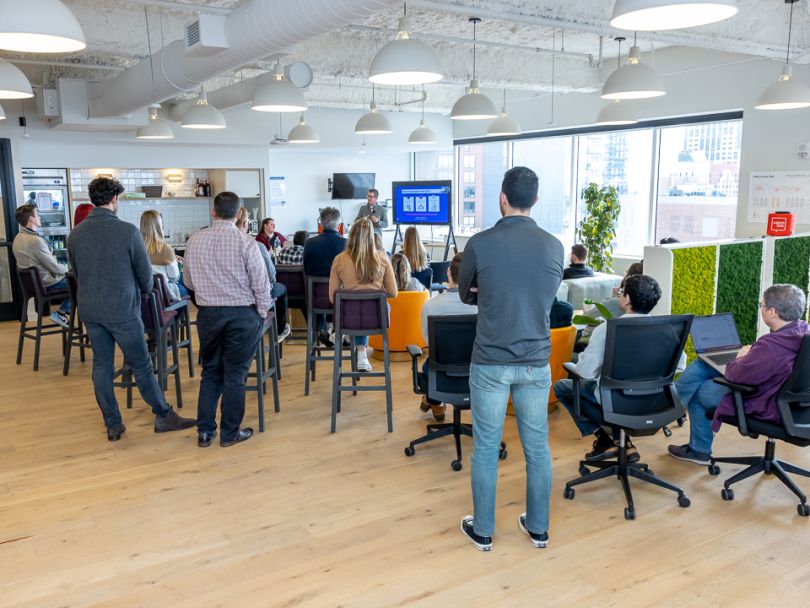In Amanda Monteforte’s first role after college, onboarding was not strongly emphasized. Even with ample support, the head-first dive into unfamiliar terrain felt more like a trial by fire than the chance to put her best foot forward.
“There was no concept of taking the time to learn before starting to work on projects. I received tons of support, but my confidence in my abilities was reduced as I felt rushed and forced to learn through my mistakes,” said Monteforte.
Monteforte is now an analytics manager at Simply Business, an organization on a mission to provide small businesses with insurance and expertise. Her initial experiences as a fresh graduate breaking into the workforce were handily outmatched by her current company’s extensive, month-long training program for new hires.
But the learning doesn’t end there.
The Impact of Quality Onboarding
According to a BambooHR study, 91 percent of employees who underwent effective onboarding reported feeling strong connectedness at work, compared to 31 percent who underwent ineffective onboarding. Likewise, 89 percent of those with positive onboarding experiences felt strongly integrated into the company culture. Well-onboarded new hires were also 18 times more likely to say they felt highly committed to their organization.
According to a Gallup survey, only 12 percent of employees feel that their organizations did a satisfactory job onboarding new employees. Meanwhile, last year, new hires indicated an increase in negative experiences during onboarding compared to 2021, according to the Talent Board’s 2022 North American Candidate Experience Report. ]
At Simply Business, the onboarding process is merely a jumping-off point. An emphasis on career growth and personal development is a mainstay throughout the employee experience.
Analytics Manager Amanda Monteforte shared how the company and its team members facilitate beneficial learning opportunities and deepen professional connections.
Creating the Optimal Conditions for Growth
When people are given the time and opportunity to grow and learn, they’ll almost always take advantage of it. Oftentimes, that opportunity can be as straightforward as giving employees a section of a day each week to make progress on their personal goals. At Simply Business, that time occurs on Friday mornings.
“Over the years, I’ve used that time in many ways, including improving my Python skills, reading about consumer behavior, refreshing my statistics knowledge and taking management training. I even used the time to do homework while completing my MBA,” Monteforte said.
“Having this space to identify and explore different learning opportunities has allowed me to expand my knowledge of my day-to-day job.”
“Having this space to identify and explore different learning opportunities has allowed me to expand my knowledge of both my day-to-day job.”
More than four years into her tenure at Simply Business, Monteforte is now focused on helping other team members fulfill their own ambitions. “I believe being available for the new starter is the most important part of an onboarding process. The one-on-one time when you give meaningful feedback on their work and answer any questions they have is key to unlocking their potential and accelerating their development.”
Things that make Simply Business’s onboarding process noteworthy:
Learning hard skills: “We want people to start to gain the tools to do their job during onboarding effectively. For example, analysts are evaluated on their technical knowledge, including their SQL and Python abilities, as well as how well they can work with our business intelligence tools.”
Feedback-driven training: “Getting feedback has helped me iterate on the process and work toward closing any existing gaps.”
A detailed look inside a new hire’s first month: “The training plan includes lessons from team members, assignments designed after past work done by analysts to mimic a real stakeholder request and online training to learn about our data and get practice using our tools.”

Setting Team Members Up for Success
At Simply Business, onboarding new hires isn’t just about learning the ropes; it’s about tapping into their career aspirations from day one and connecting them with the resources to reach goals.
“For me personally, I felt that some of the most impactful career development opportunities have been when I have been able to apply concepts that I have learned from trainings to real-life scenarios that I encounter in my day-to-day job,” Walsh said.
The learning journey starts before employees set foot in the office, and extends far beyond the immersive introductory phase into the business that occurs during “Week 0,” the first official week of onboarding.
“We offer level-ups, training and internal mobility opportunities for our employees. We believe that career development is a lifelong learning exploration, and no two career paths look alike.”
“We believe that career development is a lifelong learning exploration, and no two career paths look alike.”
This year, Simply Business is piloting its first formal mentorship program, one piece of the bigger puzzle that comprises the company’s efforts to position employees for success.
Read what Walsh had to say about:
Her personal experience as a new hire: “Any change in life can be scary, but my transition to Simply Business felt easy. The onboarding process was the strongest I have been through in my career. The trainings, meetings and the warm welcome I received from my colleagues really helped me feel great about my decision to join the company.”
Creating immediate connections in a remote environment: “Like anything with the employee experience, onboarding has evolved over time, especially with virtual onboarding that started in 2020. When everything moved to virtual, organizations needed to invest more heavily into making employees feel connected while still being apart. ”
Why investing in onboarding is a must: “Onboarding is crucial to the full candidate life cycle, starting with the positive employee experience. It is important to ensure new employees feel welcome from when they sign their offer to when they start.”
Onward and Upward
There’s no way around it: Starting a new job can be stressful. But if a company is determined to, it can create a positive experience for new hires and existing team members alike.
This acclimation process isn’t just about learning the basics of a new work environment; it’s about ensuring employees can apply their existing knowledge and skills while always considering what’s next in their professional journey.
Simply Business — and Walsh’s and Monteforte‘s experience at the company — illustrate what common denominators are missing elsewhere and why investments in team members might have a start date but not an end date.







